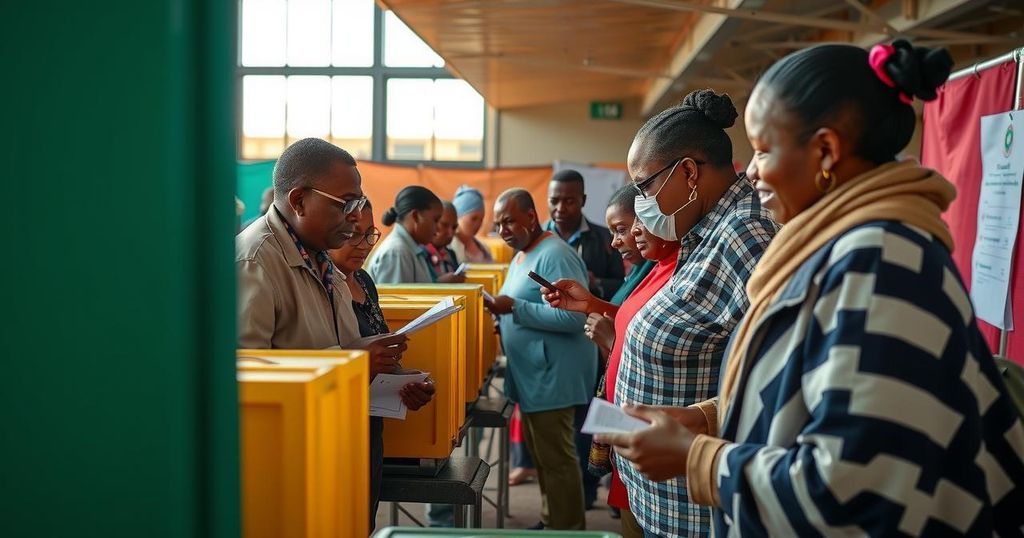Politics
AFRICA, CHRISTINE AOCHAMUS, COMMISSION, DEMOCRACY, EN, FINANCE BILL, GOVERNANCE, GOVERNMENT, INDEPENDENT PATRIOTS FOR CHANGE, IPC, KHOMAS, KLUIVERT MUUONDJO, LEADERSHIP, NAMIBIA, NET, NETUMBO NANDI - NDAITWAH, OPPOSITION, SOUTH AFRICA, SOUTH WEST AFRICA PEOPLE ’ S ORGANISATION, SWAPO, WINDHOEK, ZIMBABWE NEWS, ZIMBABWE NEWS NOW
Fatima Khan
0 Comments
Namibia Reopens Voting Amid Electoral Chaos and Rising Tensions
Namibia reopened 36 polling stations for voters after a chaotic election marked by long wait times and technical issues. Opposition parties criticized the electoral process as a “sham,” reflecting growing discontent with the ruling SWAPO party’s long-standing governance. Many voters had to wait up to 12 hours, contributing to demands for electoral reforms and a potential second round of voting.
WINDHOEK, Namibia – On Friday, Namibians returned to the polls at 36 reopened polling stations amid a tumultuous electoral process characterized by significant technical difficulties. This second reopening comes on the heels of Wednesday’s election, which was marked by long delays, leading to opposition claims that the process was a “sham.” Many voters waited in line for as long as 12 hours to cast their ballots in the presidential and legislative elections, which are particularly critical for the ruling South West Africa People’s Organisation (SWAPO), which has held power since Namibia gained independence from South Africa in 1990.
The difficulties experienced on Wednesday included technical failures with voter registration tablets, a shortage of ballot papers, and even the malfunctioning of torches intended to reveal invisible ink. Mobile voting teams reportedly departed areas where voters were still waiting in line, exacerbating the already chaotic situation. This prompted the electoral commission to extend the voting period, allowing citizens to vote until Saturday evening.
In Windhoek, the sole polling station that reopened drew about 60 voters, including 21-year-old student Kluivert Muuondjo, who expressed concern that reopening only one polling location would again result in overcrowding. Opposition parties have criticized the electoral process, with many calling for it to be halted entirely. The Independent Patriots for Change (IPC) party is expected to release a joint statement regarding the electoral situation.
The political landscape in Namibia is changing, with youth unemployment and ongoing inequalities affecting support for SWAPO, which faces challenges from a younger generation that did not experience the struggle for independence. The ruling party’s candidate, vice-president Netumbo Nandi-Ndaitwah, has the potential to make history as the first female leader if elected, but she may be required to navigate an unprecedented second round of voting in this mineral-rich nation. Many Namibians have expressed frustration over the situation, questioning how such chaos could arise with 1.5 million registered voters. “It was to get people frustrated,” stated Ensley Engermund, a voter who experienced difficulty casting his vote.
The article discusses the recent electoral challenges faced by Namibia during presidential and legislative elections. Historically viewed as a stable nation in southern Africa, Namibia encountered significant difficulties during its electoral process, raising concerns about the integrity and efficiency of its voting mechanism. Fresh criticism has emerged, underscoring the ruling SWAPO party’s longstanding dominance since the country’s independence in 1990, compounded by rising societal issues affecting voter sentiment. The dynamics of the current political landscape reflect a growing discontent among the citizens, particularly the youth, who seek significant change as they navigate post-independence realities.
The reopening of polling stations in Namibia, following significant technical disruptions during the elections, reflects the mounting tension surrounding the electoral process. With the ruling SWAPO party facing unprecedented challenges amid growing public dissatisfaction, the future of Namibian leadership remains uncertain as voters seek resolution to lingering issues. The response from opposition parties will be pivotal in shaping the direction of future governance. The outcomes of this election will not only influence the political landscape but also address the struggles faced by a generation increasingly vocal about their demands for equitable representation.
Original Source: www.zimlive.com




Post Comment